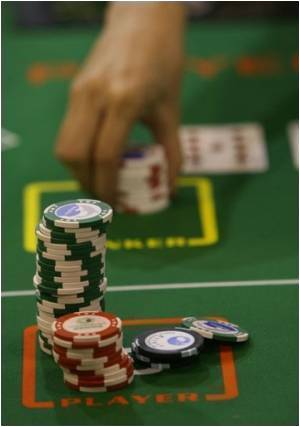
"The illusion is that you will always have the chance to win more, more, more," he told AFP.
A softly-spoken man, Stanley came to Macau in the 1990s from Guangdong, looking for opportunity, and found it: he set up his own store, worked hard and prospered. He never gambled. In 2003 he expanded, opening a property agency.
At the same time, a drastic change was taking place in Macau's economy, already profiting from a handful of casinos: the government liberalised gaming licenses, enabling foreign operators including Las Vegas giants to move in. The economy surged.
"Everything was so open," Stanley said. Even for non-gamblers, "there was this incredible freedom, this sense that you could earn money overnight."
As the property agency grew, Stanley gained clients in other parts of China who began visiting Macau and wanted to see the famous casinos.
Advertisement
"I suddenly got this feeling that winning money was easy in casinos, and after that, my reasons for going changed," he said. "At first it was just with clients, but after I won that time, I thought it would help me to get rich."
Advertisement
"Losing gave me a heartbroken feeling. I just wanted to win back the money I had lost," he said.
Stanley became part of the local gambling culture, which he said includes rituals like entering casinos by the side door, using one's left hand to turn the cards, and carrying Buddhist beads and jade charms.
If he lost in one casino he would switch to another in search of luck.
The sums he was gambling grew and grew. He had joined the legions of Macau's gambling addicts -- of whom there is an increasing number among the 570,000-strong population.
The Resilience Centre of the government's Social Welfare Bureau has received 2,800 calls to its hotline since it opened in late 2005, and counselled over 500 addicts face-to-face, while several non-governmental groups also advise problem gamblers. But many addicts are unwilling to accept help.
Elaine Tang of the Resilience Centre, who has worked with Stanley, said: "I am sure the clients we have are only small pieces of the whole picture. If people are not ready to change, it is hard to open their ears."
In Stanley's case, he realised on some level that he had a problem, but to tell anyone was unthinkable. His children were 13 and 7 at the time.
"My parents and my family all thought I was a good son, a good father, a good husband," he said.
His finances lurched wildly: once he walked into a casino with 400 patacas in hand and won 300,000. Another time he started with 200,000 patacas and was reduced to 20,000, but then he won 1.2 million -- only to lose 800,000.
One day, Stanley found he had emptied the family bank accounts of two million patacas.
He could no longer hide his addiction from his family, but Stanley's response to their discovery was to invite his wife along to a casino.
"This was the worst thing that I did," he said. "She wanted to help me, but I wanted to show her that gambling is easy and you might have a chance to win. 'You can't be always losing,' I said."
His wife bought into the illusion, and the two began gambling together. Now, all barriers to Stanley's gambling were gone.
"We borrowed from relatives, from friends, from banks, from loan sharks. I no longer cared about the property business," he said.
"My biggest sorrow was that I didn't even go back to the mainland to take care of my father, who had lung cancer. I just spent all day in the casino."
The clients of Stanley's property agency still trusted him, and so he told them he needed money for further investment. In 2006, they paid over another two million patacas, all of which vanished at the tables.
One by one, the clients found out, and Stanley's gambling whirl hit a sudden end.
He was sentenced to five years and three months in prison, and his wife -- who had helped at the property firm -- was handed three years and nine months.
"In that whole period of addiction, one and a half or two years, I lost a total of five or six million (patacas)," Stanley said.
He and his wife went to jail, and his children were taken into care. This was Stanley's lowest point, and he began thinking of suicide.
But thoughts of family held him back, while friends from his church and social workers kept visiting. With time, he began to understand the real price of his gambling.
The image that remains in his mind is that of his wife and children, crying as they left the prison one day after visiting. His feeling of "total heartbreak and guilt" was accompanied by the strength to change, he said.
He began learning plumbing and electrical maintenance, and became the prison champion in Chinese chess, a crown he held for two years. Impressed, a judge opted to release Stanley after two-thirds of his sentence.
Now, he has been out of jail for about a year and works as a driver, with a third of his earnings going to repay his debts by court order. He also works through his church to help other gambling addicts.
Most importantly, he has regained his family's trust, despite his daughter's reproaches for the years she endured without a father.
"I see a very good future," he said. "When I first came to Macau I started a business all by myself. Now I have nothing again, but I believe that I can build."
Stanley still lives with the presence of the mega-casinos. Their ads flash from buses, and the casino buildings -- extravagantly decorated in gold and bright lights -- dominate the horizon.
But although relapse is a problem for many compulsive gamblers, he says he is never tempted to go inside. "I'd be much too afraid," he said.
Source-AFP








